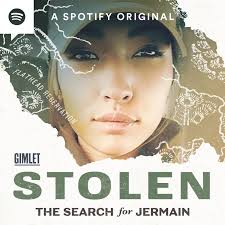Podcast host Connie Walker, who is Cree from Okanese First Nation in Canada, has made it her life’s work as a journalist to tell the stories of missing and murdered Indigenous women. “Stolen: The Search for Jermain,” marks not only her first story with Gimlet Media but also the first U.S. case of a missing Indigenous woman that she’s investigated.
Since the podcast premiered in early March, host Connie Walker has investigated Jermain’s disappearance speaking with her friends, family, law enforcement and bystanders, uncovering inconsistencies in her case, sharing what life was like for Jermain at home on the Flathead Reservation in Montana, and the larger issue of domestic violence against Indigenous women in the U.S.
Now, “Stolen: The Search for Jermain” from Spotify/Gimlet has just released a bonus episode with a development in Jermain Charlo’s case surrounding her ex-boyfriend, Michael.
In episode eight, Walker talked with investigators and family members, reflecting on this ongoing case and questioning reasons why movement on it has been delayed. Throughout the series, Connie has reported on Jermain’s life on the Flathead Reservation, her abusive relationship with former boyfriend Michael, and all the trauma that led up to the night she went missing.
In that eighth and final episode, we heard from Michael as Connie attempted to get his side of the story. Connie also joined another search party for Jermain and an awareness walk for missing and murdered Indigenous women as we continued to hear from Jermain’s loved ones.
Last week, Michael was arrested and is facing an unusual charge in federal court, one that could be connected to Jermain’s case. In this bonus episode, Connie speaks with a reporter present at Michael’s court appearance last week, an attorney, and Detective Guy Baker - the lead detective on Jermain’s case - to see what this means for her case and if they’re closer to giving Jermain’s loved ones the answers they’ve been searching for since 2018.
In case you need a refresher, Jermain is a young Indigenous mother in Montana who went missing in 2018. When the podcast ended back in April, there were many suspicions around her ex-boyfriend Michael (and father to her children) and his involvement in Jermain’s disappearance as Connie and Jermain’s family were shocked when they found evidence that Jermain’s cell phone was last traced near or on the property of Michael’s home the night she disappeared. In addition, there was reason for the Sheriff’s Office to believe that Michael was using his property to tamper with evidence or as a possible grave site location.
The core mission of this podcast is not only to find out what happened to Jermain, but also to shed light on the epidemic of violence against Indigenous women in the U.S. that’s not typically covered by mainstream media. Jermain is one of thousands of missing and murdered Indigenous women in the U.S., a topic paramount to Connie, who is Cree from Okanese First Nation in Canada and has made it her life’s work as a journalist to highlight this epidemic that’s gone uncovered by the mainstream media for far too long.
“Stolen: The Search for Jermain” underscored the abuse faced by Native American women, who are more than twice as likely to experience violence than any other demographic. One in three Native American women is sexually assaulted during her life, and 67 percent of these assaults are perpetrated by non-Natives.
Currently, the federal laws surrounding violent crimes create difficulties in dealing with non-Native perpetrators on native lands.
During the run of the podcast's episodes, U.S. Interior Secretary Deb Haaland made a public announcement about the creation of an investigative unit to probe cases of missing and murdered Native Americans, which felt like a major win for the podcast.
The federal government formed a task force on the issue in 2019 to pursue such cases. Haaland said the new unit will expand on that work and establish a unit chief position to develop policy for the unit. The unit will review unsolved cases and work with tribal, BIA and FBI investigators on active cases as well, according to the department.
“Violence against Indigenous peoples is a crisis that has been underfunded for decades. Far too often, murders and missing persons cases in Indian country go unsolved and unaddressed, leaving families and communities devastated,” Haaland said in a statement. “The new unit will provide the resources and leadership to prioritize these cases and coordinate resources to hold people accountable, keep our communities safe, and provide closure for families.”
You can check out the bonus episode HERE.

Comments
Post a Comment
Thank You for your input and feedback. If you requested a response, we will do so as soon as possible.